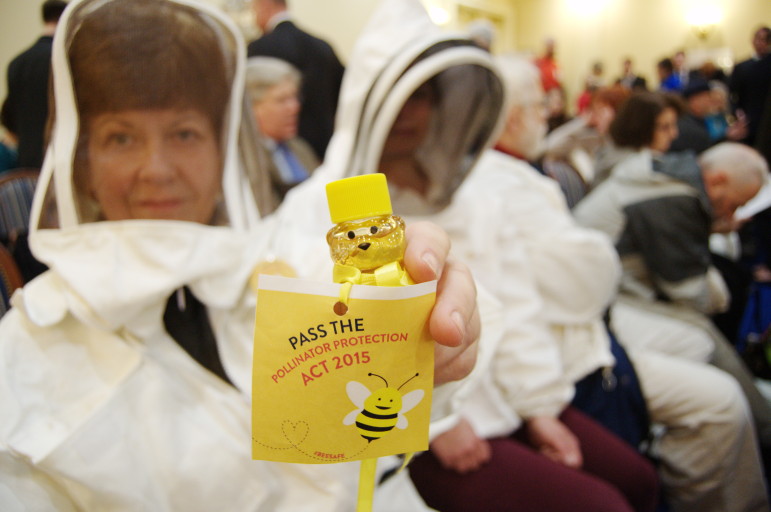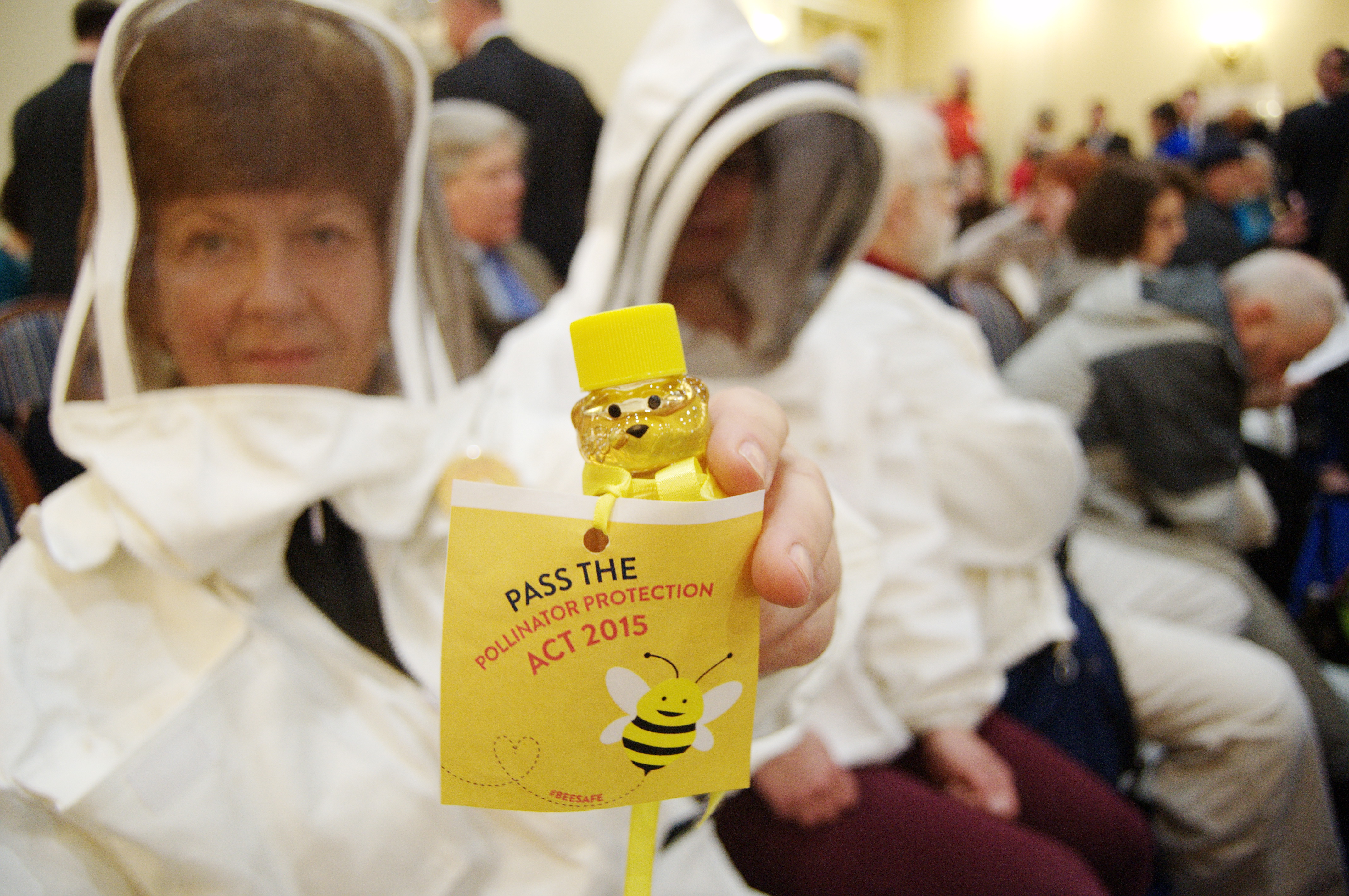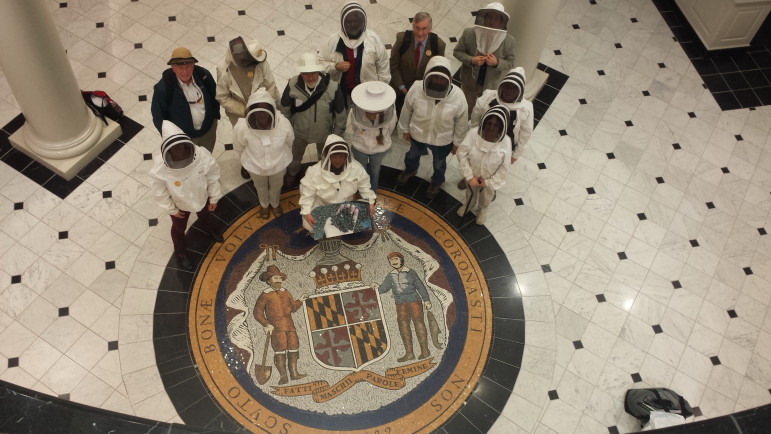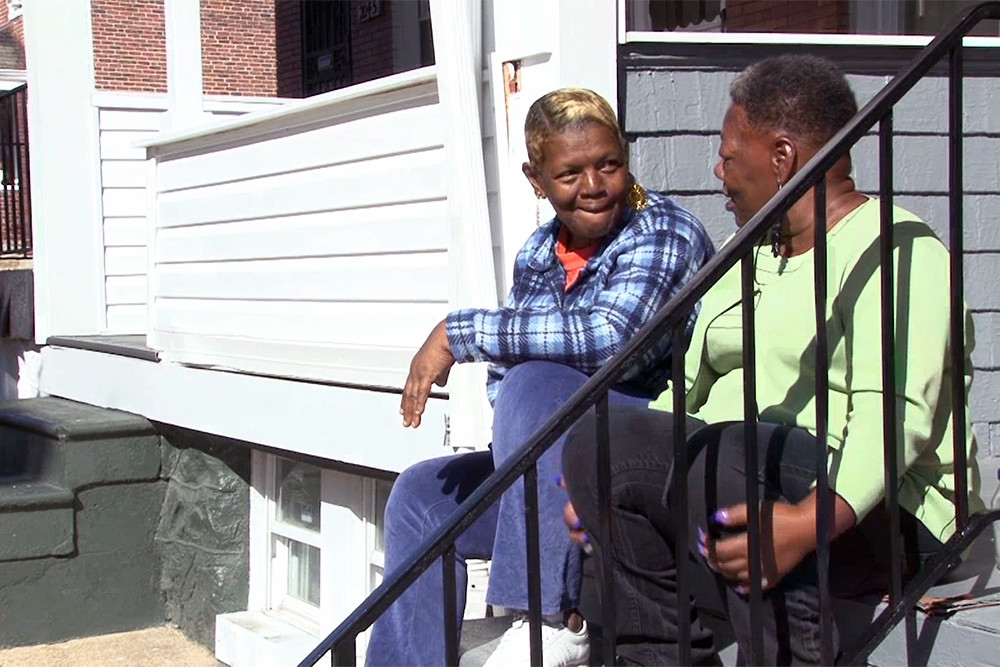By Rona Kobell
Bay Journal

Sondra Novo, a beekeeper from Harford County, holds a honey-filled bear which she and other beekeepers delivered to legislators’ offices. (By Rebecca Lessner for MarylandReporter.com)
Maryland beekeepers are again hoping that the state’s legislature passes a bill in 2016 to label a class of pesticides, neonicotinoids, as harmful to bees and restrict sales of the chemicals to commercial and agricultural applicators.
The Maryland Pesticide Network pushed for the Pollinator Protection Act in 2015 after nearly a decade of concern about bee deaths as reported here last year. Many beekeepers and scientists believe that the use of neonicotinoids, a class of pesticides now common in both agriculture and home gardening, is killing bee populations in Maryland and elsewhere.
Neonicotinoids are not as toxic to humans and other mammals and birds as some other classes of pesticides, but they are lethal to pests such as aphids, which prey on garden plants. Bees ingest the neonicotinoids as they seek pollen from crops and flowers and the poisons enter their cells. The bees can’t break them down and soon die. Without worker bees, the queen can’t maintain the hive, and the colony collapses.
Large bee losses
But the bill did not pass, in part because the sponsors could offer no conclusive proof that it was the neonicotinoids that killed the bees. Maryland is one of the states with the largest bee losses.
In 2012, Maryland beekeepers lost 60% of their bees, about twice the national average and far more than is typical in a year. Opponents to the bill’s passage argued that the die-offs could have come from poor management, changes in weather patterns, the incorrect application of pesticides and increased parasites.
The legislators agreed to study the topic and to try to come up with a solution.
Beekeeper Steve McDaniel, who has hives in rural Carroll County as well as Baltimore City, remains convinced that it is neonicotinoids that killed his bees. In 2014, he said, he lost 20 of 26 hives during a mild fall when he took care to feed them.
“In 2012, I started losing bees no matter what I did,” McDaniel said. “It was just about the time they put those blue bottles on the shelves.”
Blaming blue bottles
The blue bottle McDaniel refers to is a Bayer product with neonicotinoids in it that promises to rid rose bushes of pests. McDaniel often carries a bottle with him to honey shows and nature centers to alert consumers of the dangers because the bottle has no label warning that it is harmful to bees.
Bayer has said there’s no evidence the products harm bees, but the European Union has suspended their use, and several states are studying the science and considering their own bans on the products.
Currently, the EPA regulates neonicotinoids, and the Maryland Department of Agriculture is charged with investigating any problems with spraying as well as maintaining records of who has licenses to spray insecticides and where.
In response to concerns about the pesticides, the EPA this fall announced a moratorium on new permits to spray neonicotinoids, though it did not rescind the permits already issued. In response, some stores stopped carrying the products voluntarily.
Ag department claims high cost
Asked about the Pollinator Protection Act, Maryland Department of Agriculture spokesperson Julie Oberg referred to the department’s legislative comment on the bill. It says that the department will face “ a significant additional fiscal and operational burden” if the bill passed.
In 2000, when the U.S. government approved spraying neonicotinoids on corn, beekeepers in California started noticing die-offs. The country has more than 100 million acres of corn, and in many cases, seeds were coated in the pesticides before being planted. Recent studies have shown that neonicotinoids can enter the water and harm crabs and fish, said Carys Michelmore, an associate professor at the University of Maryland Center for Environmental Science.
Wayne Esaias, a NASA scientist who was past president of the Maryland Beekeepers Association, said neonicotinoids are only part of the problem. But, he said, if the state passed the Pollinator Protection Act, it should also add more provisions for better enforcement. Beekeepers, he said, need to know what chemicals are being sprayed, and where.
The Maryland Department of Agriculture has that information, but does not share it with the public.
His colleague at the Central Maryland Beekeepers Association agreed.
Lack of information
“Right now, we have no idea how much is being sprayed, when it’s being sprayed and how it’s being sprayed,” said Roger Clark Williams, the organization’s president. “Nobody’s required to turn those records in.”
Esaias and Williams said they have both lost large percentages of bees in recent years. In addition to pesticides, they blame the change in landscape that has meant more crops grown in a monoculture, and a society that is in general less tolerant of weeds, wildflowers and anything that is not perfectly manicured.
One lost beehive can cost beekeepers about $1,000. At a recent subcommittee hearing on the bill for 2016, Ruth Berlin of the Maryland Pesticide Network testified on the economic loss to beekeepers. But no beekeepers were invited to speak, though McDaniel was present in case legislators wanted to hear from him.
Bonnie Raindrop, who raises bees in Pennsylvania and Baltimore County, said she’s concerned about the lack of income and also the future of bees in Maryland. She lost half her bees in 2012, all of them in 2013, and half again in 2014.
“We don’t have time to debate whether it’s the one thing [neonicotinoids] — which most beekeepers agree that it’s not. But it is the one thing we can address pretty quickly,” Raindrop said.
Williams said the bill is hardly radical — consumers will still be able to buy the products, but only from specialized stores. Farmers will still be able to use them. The idea is to target only a small percentage of users — home gardeners — to see if that gives bees some relief. But even that part has been unexpectedly difficult.
This article appears in the December issue of the Bay Journal. Rona Kobell can be reached at rkobell@bayjournal.com.








Recent Comments